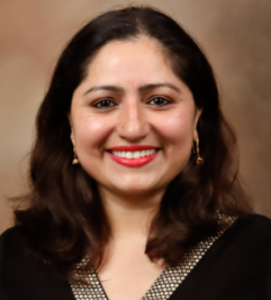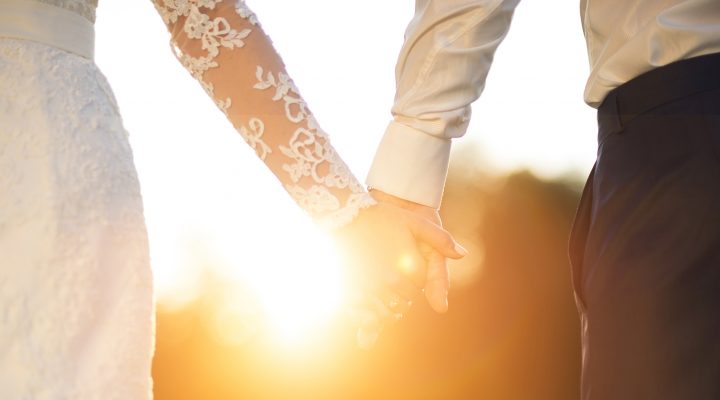Muslim women in Western and Islamic societies are increasingly standing up against Quranic interpretations barring them from marrying non-Muslims, religion scholar Shehnaz Haqqani said.
“My respondents insist their marriages are Islamically valid and Islamically grounded, and that their marriages are ethical and equitable and that neither member of the relationship is superior or dominant over the other,” said Haqqani, an assistant professor of religion at Mercer University in Macon, Ga.

Shehnaz Haqqani
Haqqani recently was awarded a short-term publication grant from the American Association of University Women to help finance her ongoing research into the dynamics of Muslim women’s unions with non-Muslims.
To date, Haqqani has conducted nearly 40 of 50 planned interviews with Muslim women, mostly in the United States but some also in Canada, the Middle East and Asia. The book project was born from a chapter in her Islamic studies Ph.D. dissertation, “Islamic Tradition, Change, and Feminism: The Gendered Non-Negotiable,” at the University of Texas at Austin.
“There is a popular idea among Muslims that men can marry Christians and Jews — ‘people of the Book’ — but women cannot. This idea of focusing on Muslim women’s understanding of interfaith marriage is a highly relevant but understudied research area,” she said.
The source of the misunderstanding originates in centuries of interpretation of Quranic verses that explicitly permit Muslim men to marry women from other Abrahamic faiths, but are silent on whether women may follow suit, Haqqani said.
In 1,400 years of intellectual and exegetical writings on the Quran, that silence has largely been “interpreted to support men but prohibit women in the matter of interfaith marriage. But in the Quran there really is no such prohibition. It only has things to say on not marrying polytheists.”
“In the Quran there really is no such prohibition.”
There are instances in Islamic history and tradition that support the right of women to marry partners from other faiths, including sayings the Prophet Muhammad allowed one of his daughters to marry a non-Muslim who also was a polytheist, she said. “Despite having the power and authority, he never ordered her to divorce him.”
Haqqani said her book project was inspired after repeated encounters with Muslim women who have begun to question the validity and fairness of traditional bans on marrying outside of Islam. “I kept meeting these friends of mine who couldn’t marry because they thought Islamic law didn’t permit it, and they found this interpretation to be unfair and discriminatory.”
But those women also had come to see that traditional interpretations didn’t line up with the love, mercy and equality they found in their interfaith relationships and in the pages of the Quran. Many of them also had come to see through the patriarchy that informs the prohibition.
“We know that, historically in any society, women have been discriminated against as a form of sexual control,” Haqqani said.
Contrary to popular opinion, she added, Muslim women are not entering into interfaith marriages because Muslim men are patriarchal or misogynistic. “That’s a stereotype that I’m not seeing in my research. People aren’t saying, ‘I prefer non-Muslim men.’ But in the U.S., especially, these women are saying they are simply more likely to meet non-Muslim partners.”
“In the U.S., especially, these women are saying they are simply more likely to meet non-Muslim partners.”
Even Muslim women who have had negative experiences with Muslim men have said they also have known other Muslim men to be equitable and compassionate, she said. “They just aren’t coming across those men in their settings.”
But there are challenges for Muslim women and their husbands in interfaith marriages, including immense pressure on grooms to convert to Islam before their weddings. In some cases, non-Muslim men will “convert nominally for the sake of appearances and to satisfy the parents,” she said. “But many do not practice Islam.”
Haqqani added she hasn’t heard any of her respondents express a desire to convert their husbands to Islam after getting married. “They describe their relationships as being founded on love and compassion and respect for each other’s faiths.”
Nor have the interviewees said they felt pressured to convert to the religion of their husbands, she added. “All my respondents are very clear they are still Muslim and nobody is taking their identity or their religion away from them.”
Some Muslim women married to non-Muslims have reported problems with in-laws in cases where children are being raised to observe Islamic practices. For example, some Islamophobic in-laws have been known to secretly feed pork to grandchildren who are not supposed to consume it, Haqqani said.
But there are also positive stories, such as non-Muslim husbands not eating in front of their wives during the Ramadan fast.
“The common theme I am finding is that these are women who believe in equality and in the dignity of all people and that they consider their marriages to be Islamic and that the prohibitions are un-Islamic,” she said.


